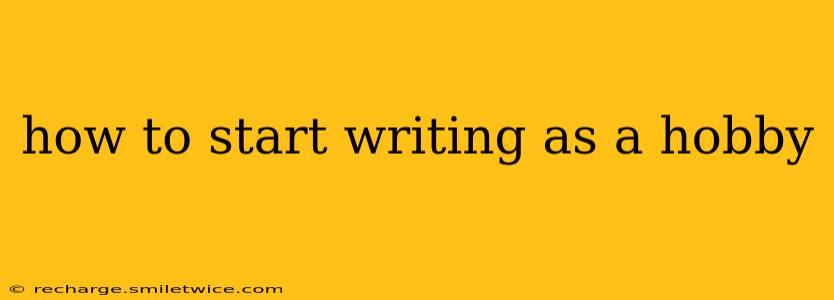So, you're thinking about taking up writing as a hobby? Fantastic! Whether you dream of crafting gripping novels, insightful essays, or witty poems, the world of writing offers endless creative possibilities. This guide will walk you through the essential steps to start your writing journey, regardless of your experience level.
What Kind of Writing Interests You?
Before diving in, consider what type of writing appeals to you. Different genres require different approaches. Do you envision yourself:
- Crafting captivating stories? Explore fiction writing – short stories, novellas, or novels.
- Expressing your thoughts and opinions? Non-fiction writing, including blogging, journaling, or essay writing, might be your perfect match.
- Painting vivid pictures with words? Poetry could be your creative outlet.
- Sharing your experiences? Memoir writing allows you to explore your personal journey.
- Creating engaging content for the web? Content writing for websites and blogs is a growing field.
Choosing a genre you genuinely enjoy will significantly impact your motivation and commitment.
Setting Up Your Writing Space and Routine
Creating a dedicated writing space, even a small corner of a room, can significantly boost your creativity. This space should be free from distractions. Establish a consistent writing routine, even if it's just for 15-30 minutes daily. Regularity is key to developing your writing skills and building momentum. Experiment with different times of day to find what works best for your creative flow.
Overcoming Writer's Block: Tips and Tricks
Writer's block is a common challenge for both beginners and experienced writers. Here are some strategies to overcome it:
- Freewriting: Write continuously for a set period without editing or worrying about grammar. This helps unlock ideas and get your thoughts flowing.
- Mind Mapping: Visualize your ideas by creating a mind map. This can help you organize your thoughts and identify connections between ideas.
- Changing Your Environment: A change of scenery can often spark creativity. Try writing in a coffee shop, library, or park.
- Reading: Immerse yourself in the work of other writers to gain inspiration and learn from their techniques.
Remember, writer's block is temporary. Be patient with yourself and keep practicing.
What are the first steps to start writing a novel?
Starting a novel can seem daunting, but breaking it down into smaller steps makes it manageable. Begin with outlining your plot, creating compelling characters, and establishing a setting. Don't worry about perfection in the first draft; focus on getting your story down. Many writers find it helpful to start with a compelling opening scene to hook the reader. Consider joining a writing group for feedback and support.
How can I improve my writing skills?
Improving your writing is an ongoing process. Here are some key strategies:
- Read Widely: Expose yourself to different writing styles and genres. Pay attention to how authors use language, structure their stories, and create compelling characters.
- Practice Regularly: The more you write, the better you'll become. Make writing a regular habit, even if it's just for a short time each day.
- Seek Feedback: Share your work with others and ask for constructive criticism. A fresh perspective can help you identify areas for improvement.
- Study Grammar and Style: Understanding the rules of grammar and style will help you write more clearly and effectively.
What are some good resources for aspiring writers?
Numerous resources are available to help aspiring writers hone their craft. These include online writing courses, workshops, writing communities, and books on writing techniques. Explore online platforms offering writing prompts and challenges to stimulate your creativity. Many libraries offer writing groups and workshops as well.
Embrace the Journey
Writing is a rewarding journey of self-discovery and creative expression. Don't be afraid to experiment, make mistakes, and learn from your experiences. The most important thing is to enjoy the process and let your creativity flow. Celebrate your progress, no matter how small, and remember that consistent effort is the key to success.
